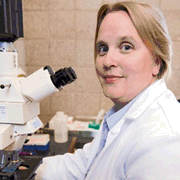
Results from a multi disciplinary study into improving post thaw function in MSCs has just been published in the journal Stem Cells and Development. Current methods for freezing mesenchymal stromal cells (MSCs) result in poor post-thaw function, which limits the clinical utility of these cells. The investigation, carried out by Pollock, Samsonraj et al with Professor Allison Hubel, (pictured here), a Mayo Clinic and University of Minnesota collaboration, developed a novel approach to preserving MSCs using combinations of sugars, sugar alcohols, and small-molecule additives. MSCs frozen using these solutions exhibit improved post-thaw attachment and a more normal alignment of the actin cytoskeleton compared to cells exposed to dimethylsulfoxide (DMSO). As a part of the protocol the team used a Planer controlled rate freezer with a six part programme starting at -20oC with differing rates cooling down to -100oC before transferring to liquid nitrogen. The authors point out that rapid cooling and warming steps in their freezing profile correspond to a temperature spike which is included in the freezing ramps to reliably induce extracellular ice formation in the samples before they undercool substantially - which can result in undesirable intracellular ice formation when nucleation does finally occur.
Osteogenic and chondrogenic differentiation assays showed that cells retained their mesenchymal lineage properties and genomic analysis indicated that the different freezing media evaluated had different effects on the levels of DNA hydroxymethylation, which are a principal epigenetic mark. RNA sequencing and quantitative real time-polymerase chain reaction validation demonstrated that transcripts for distinct classes of cytoprotective genes, as well as genes related to extracellular matrix structure and growth factor/receptor signaling are upregulated in experimental freezing solutions compared to DMSO. The studies validate the concept that DMSO-free solutions can improve post-thaw biological functions and are viable alternatives for freezing MSCs. These novel solutions promote expression of cytoprotective genes, modulate the CpG epigenome, and retain the differentiation ability of MSCs, suggesting that osmolyte-based freezing solutions may provide a new paradigm for therapeutic cell preservation.
For further information:-
Improved Post-Thaw Function and Epigenetic Changes in Mesenchymal Stromal Cells Cryopreserved Using Multicomponent Osmolyte Solutions
https://www.ncbi.nlm.nih.gov/pubmed/28178884
Allison Hubel, PhD Department of Mechanical Engineering University of Minnesota
This email address is being protected from spambots. You need JavaScript enabled to view it.
Andre J. van Wijnen, PhD Department of Orthopedic Surgery Mayo Clinic,
This email address is being protected from spambots. You need JavaScript enabled to view it.
Planer controlled rate freezer - kryo 560
https://planer.com/products/cryo-freezers/medium-crf/kryo-560.html

